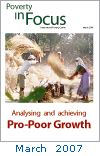
Abstract:"The reduction of income poverty is largely associated with long-term economic growth. There seems to be a broad consensus among analysts and policy makers that per capita income growth is a major element of sustainable poverty reduction. However, similar rates of growth can have very different impact on income poverty under different conditions, varying in time and space. Poor women and men are not just beneficiaries but primary creators of growth. The extent of poverty reduction depends on the degree to which the poor participate in the growth process and share in its proceeds, i.e. on inequality in the asset and income distribution. Thus, both the pace and pattern of growth matter for poverty reduction. The distinction between pro-poor growth and general economic growth is crucial for policy analysis and for formulating poverty reduction strategies. Yet, there is no consensus about how to define and measure pro-poor growth. The International Poverty Centre (IPC) initiated a debate on this issue among researchers in 2004-05 in a series of One-pagers, summarised in Number 6: Pro-poor growth: finding the Holy Grail, available on the website. This issue of IPC’s journal Poverty in Focus is not so much about the definition of propoor growth as about analytical and policy approaches, and results. The authors spell out and apply different definitions and measures in discussing various policy-related aspects of pro-poor growth and summarising research results. It is clear that much more pro-poor growth, whatever the definition, is needed in most countries if the first Millennum Development Goal is to be achieved." (...)